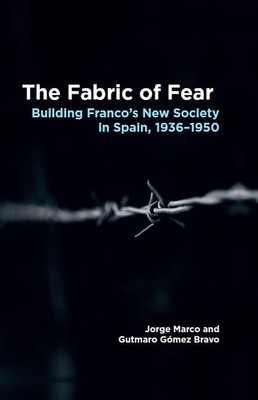
- We will send in 10–14 business days.
- Author: Jorge Marco
- Publisher: Liverpool University Press
- ISBN-10: 1789761069
- ISBN-13: 9781789761061
- Format: 15 x 22.4 x 2 cm, hardcover
- Language: English
- SAVE -10% with code: EXTRA
Reviews
Description
The Fabric of Fear deals comprehensively with the process of Francoist state- and nation-building in Spain. Franco's chosen tools were mass repression and cleansing, undertaken both during the battlefield war of 1936-39 and in the decade afterwards, when war against defeated constituencies continued by institutional means. Mobilising its grass roots supporters made them complicit in the state's project. The complex process of cleansing and conversion of the political enemy required classifying soldiers from the defeated Republican army and Republican-zone civilians into pro-Franco, indifferent, or internal enemy. Many of the latter were either extrajudicially murdered or executed after cursory military trials. Classification used ultra-traditionalist Catholic means, including segregation and forced conversion. The new society programme implemented between 1936 and 1950 was applied nation-wide to political activists, members of Republican parties, labour organisations, and (poor)urban and (landless) rural social constituencies. The Francoist project adapted to the changing national and international contexts across the period 1936-1950: from a civil war; through the period of relations with the Axis powers at the same time as receiving Nazi assistance in building up Franco's police force as an agent of repression; to the transformation of Franco into an anti-Communist client of the Cold War West. The Fabric of Fear addresses the social effects of the cleansing process on both victors and vanquished. On the one hand, Franco's violent policy forged a new society and tightened the links between the regime and its social base. On the other hand, the violence and coercion exerted on the vanquished resulted in their civil and legal death: they were expelled from Franco's national community and deprived of all rights in what became de facto an apartheid society in Spain.
EXTRA 10 % discount with code: EXTRA
The promotion ends in 17d.04:39:37
The discount code is valid when purchasing from 10 €. Discounts do not stack.
- Author: Jorge Marco
- Publisher: Liverpool University Press
- ISBN-10: 1789761069
- ISBN-13: 9781789761061
- Format: 15 x 22.4 x 2 cm, hardcover
- Language: English English
urban and (landless) rural social constituencies. The Francoist project adapted to the changing national and international contexts across the period 1936-1950: from a civil war; through the period of relations with the Axis powers at the same time as receiving Nazi assistance in building up Franco's police force as an agent of repression; to the transformation of Franco into an anti-Communist client of the Cold War West. The Fabric of Fear addresses the social effects of the cleansing process on both victors and vanquished. On the one hand, Franco's violent policy forged a new society and tightened the links between the regime and its social base. On the other hand, the violence and coercion exerted on the vanquished resulted in their civil and legal death: they were expelled from Franco's national community and deprived of all rights in what became de facto an apartheid society in Spain.


Reviews